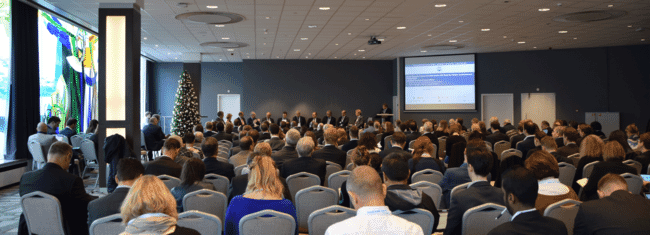This is the firm belief of Paul Holthus, founder and CEO of the World Ocean Council (WOC), who is keen to recruit more fisheries and aquaculture businesses to the WOC’s cause of “Corporate Ocean Responsibility” and to take part in its annual Sustainable Ocean Summit (SOS).
He hopes that the seafood industry’s participation in the forthcoming SOS will be considerable, not least due to its location, as it’s being held in Halifax, Nova Scotia on 29 November to 1 December this year.
“Being located on the east coast of Canada – close to key farming areas such as Canada, Norway, the UK and the Faroes – we are working for the conference to have significant engagement from the aquaculture industry,” he says.
Indeed, although the WOC represents a wide range of maritime interests – including shipping, renewables, mining and oil & gas – he points out that aquaculture is set to feature prominently at the event.
“There will be at least one dedicated session on aquaculture and how it fits into the wider multiple use of marine areas,” Paul explains.
Long term vision
Aquaculture is also set to feature in a session that is fast becoming one of SOS’s trademark events.
“Each year we have a session in which representatives of all the key maritime industries are given 15 minutes each to outline trends and make predictions about where their sector will develop over the next 10 years or so,” Paul explains.
“The Ocean 2030 panel is one of our signature sessions and is always popular, on two different levels,” he continues. “On one hand it helps the different maritime industries understand one another; on the other the non-industry folks in the audience (especially the scientists and representatives of NGOs) get a clear understanding of just how much is going on the oceans.”
“These are the people who are often shaping public perception of ocean-based business but many of them have come up to me afterwards and commented how amazed they are by the scale of industries operations at sea,” he points out.

He also sees the WOC and SOS as both having huge potential to foster co-operation and dialogue between different sectors. For example, the work by the WOC to improve communication between fisheries and the marine mining industry.
“The CEO from Sanford participated in a session at SOS in Singapore in 2015 that brought together the head of fishing companies and marine mining companies. As a result, he has continued to interact with marine mining companies when it comes to issues surrounding nearshore mining in New Zealand and its effects on fisheries,” he reflects.
And he is hoping that this year’s SOS will have a similar impact.
“There will be a special session bringing the fisheries sector together with the offshore wind and offshore oil & gas sectors in order to try and find common ground and avoid public confrontation over key issues. It makes more sense for difference ocean user industries to try and understand each other than to end up fighting each other in the courts,” he explains.
Conservation background
WOC, a non-profit organisation, was established by Paul in 2008. Following a long and varied career in international marine science, management and policy – which included stints with the UN Environment Programme, the Asia-Pacific branch of the Nature Conservancy and as Deputy Director of the IUCN Global Marine Programme – he realized that he was more interested in the more important need to engage with businesses as the likely best means of achieving more sustainable management practices in the ocean.
"The WOC mission and mandate emerged over a decade ago – the concept is to encourage ocean sustainability across maritime sectors by creating a multi-industry business community focused on ocean sustainable development,” he reflects.
This philosophy has been steadily gaining momentum – both in terms of the growth of WOC itself (it currently counts over 34,000 in its network) and it terms of the influence it is exerting on other bodies.
“We were the only ocean business organization involved in the development of the UN’s Sustainable Development Goals (SDGs) from the very early stages of the process,” Paul explains.
Looking to the future
Despite such notable successes, Paul believes there is still considerable work to be done, and he’s keen to bring more fisheries and aquaculture businesses on board.
“We’d like to encourage more companies in fisheries and aquaculture to get involved in the WOC’s cross-sectoral industry efforts on ocean sustainable development. There has been an increase in involvement in the last year or so, as the need for a healthy ocean becomes more clearly seen as the basis for healthy fisheries and sustainable aquaculture,” he explains.
Part of the problem, as Paul sees it, is that aquaculture and fisheries firms have been forced to focus on local issues first and foremost.
“Most aquaculture companies have been preoccupied with immediate, sector-specific sustainability issues, without being able to address the broader sustainability issues at stake in our oceans today,” he reflects.
While some localised sustainability issues are proving persistent, many of the major players in the aquaculture industry do appear to be adopting a more global approach to sustainability – in terms of sourcing feed ingredients, for example, and through their commitment to bodies such as the Global Aquaculture Alliance, Aquaculture Stewardship Council, and Global Salmon Initiative (GSI). However, the goals of WOC should help to support such visions, perhaps more specifically if a planned new program area takes off.
“We’re planning to publish a review and analysis of the SDGs and clarify the implications they have for ocean industries. In the longer term, it’s our aspiration to draw up some guidelines – complete with examples of companies who are already following SDGs in each sector – to help maritime businesses become more sustainable,” he reveals.

